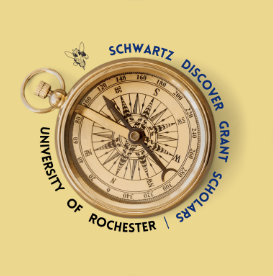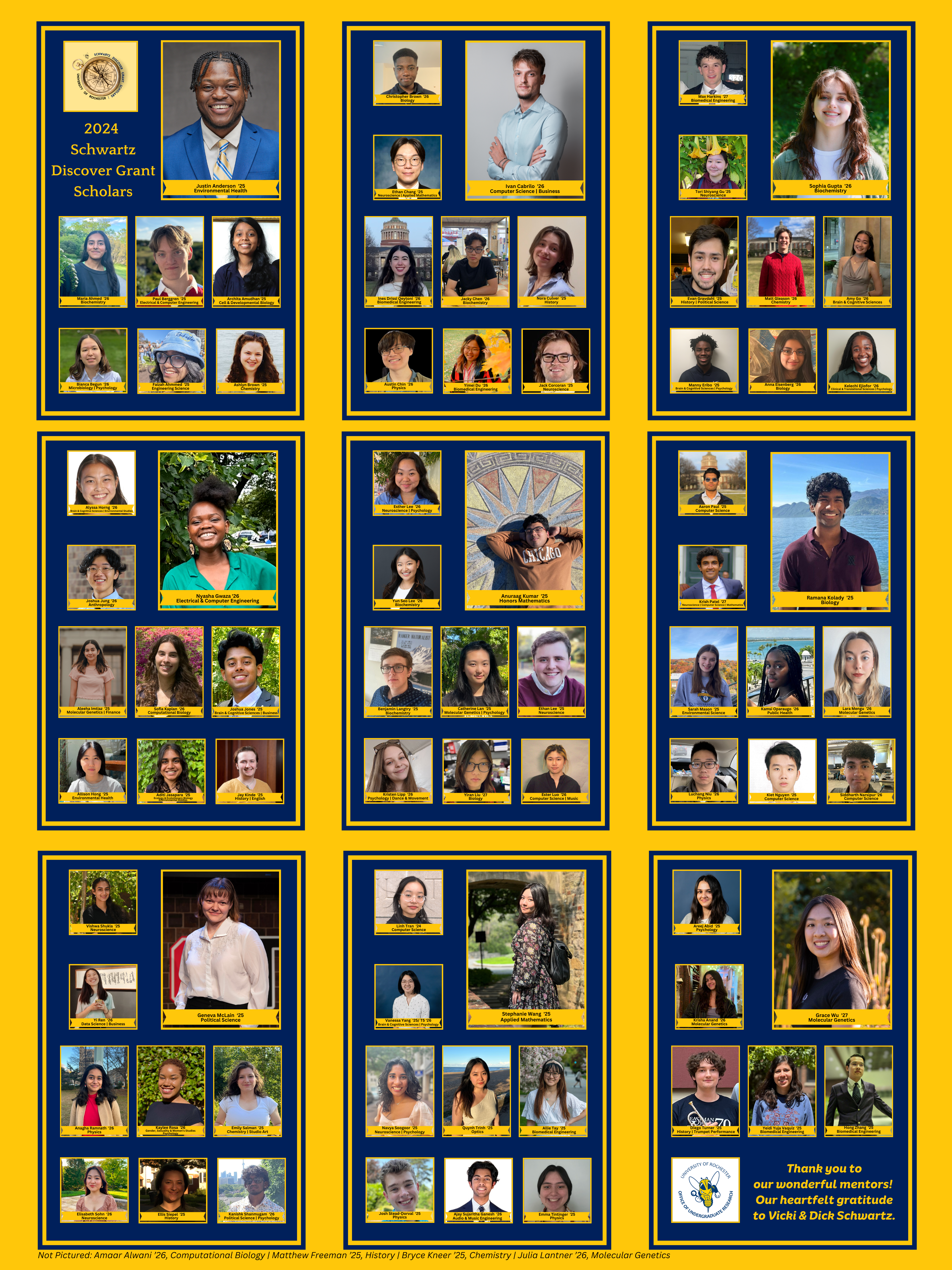Schwartz Discover Grant

The Schwartz Discover Grant for Undergraduate Summer Research supports immersive, full-time summer research experiences for University of Rochester undergraduates in the School of Arts & Sciences and the Hajim School of Engineering. The goal of the program is to help students get involved in research early in their academic careers and enhance their competitiveness for future fellowships and other advanced research opportunities.
Fast Facts
- Application opens: January 1, 2026
- Deadline: March 1, 2026 at 11:59 p.m.
- Decisions announced: April 3, 2026
- Purpose: Living expense support to be used toward early academic career, mentored summer research projects that are otherwise unpaid
- Eligibility: University of Rochester undergraduates in the School of Arts & Sciences and the Hajim School of Engineering—with the exception of graduating seniors—working under the mentorship of a University of Rochester faculty member
- Time requirement: Minimum of 300 hours of research-intensive involvement between May 18 – July 31, 2026
- Funding: Up to $5000 fellowship to support living expenses. Funds will be disbursed no later than May 31; details about the payment process will be shared with grantees. Students with Research and Innovation Grants (RIG) who still have money left in their accounts will have that money drawn from first. The Office of Undergraduate Research will supplement the remainder to bring the total to $5,000.
Info Sessions and Workshops
SDG General Info Sessions: grant eligibility, how to apply, and how to get started on great written statements.
In-person:
- Thursday, November 20, 2025
- 5:30-6:30 p.m.
- Dewey Hall, room 1-101
Virtual:
- Friday, December 5, 2025
- 3:30-4:30 p.m.
- Register via THIS LINK
Research proposal workshops with the Writing, Speaking & Argument Program (WSAP)
- Early spring semester (2026 dates TBD; likely early February)
Writing sessions just for SDG applicants, hosted by the WSAP Center located in Rush Rhees Library, RR G-121. Bring your application draft and get personalized feedback.
Ask an SDG Alum Workshop
- Tuesday, February 17, 2026
- 5:30-7:30 p.m.
- Feldman Ballroom, Douglass Commons
Ask questions and get one-on-one feedback from prior SDG recipients. During this drop-in format, we will have multiple SDG alums from a variety of majors available to answer your questions, look over your draft, and offer tips on creating a strong application.
For assistance in crafting your resume, please see the resources provided by the Greene Center for Career Education and Connections.
For assistance and feedback with writing your proposal, please see the Writing, Speaking, and Argument Program to work with a Writing Fellow or to form your own Discover Writing Group.
Eligibility
- University of Rochester undergraduates in the School of Arts & Sciences and the Hajim School of Engineering who will continue enrollment into Fall 2025 (including December 2025 graduates and T5 or e5 students) are eligible.*
- Projects of all disciplines are eligible for the Discover Grant; however, they must
- take place during the summer,
- be otherwise unpaid (no hourly wage or large fellowship stipend), and
- be conducted under the mentorship of a University of Rochester affiliated mentor.
- Your UR-affiliated mentor can work anywhere within the University of Rochester system: River Campus, URMC, the Laser Lab, Mt. Hope Family Center, etc.
- Independent field or archival work may take you outside of campus walls—for example, a history or political science project that takes you to a research site in Mexico or China (with compliance to UR travel guidelines). These projects are still eligible, so long as you are working with a Rochester-affiliated mentor to help guide your project.
- Students engaging in their first research experience are strongly encouraged to apply.
- Students will only be able to receive one full Discover Grant during their time at UR. Students who received partial funding may reapply.
Not eligible for Discover funding:
- May 2025 graduates.
- Previous Discover Grant awardees.
- Programs that include a fee or tuition to participate, including study abroad.
- Research projects conducted under non-UR-affiliated mentors. Summer research projects mentored by non-UR-affiliated mentors are eligible to apply for Summer Internship Funding through the Greene Center.
- Entrepreneurial projects. Students interested in entrepreneurship should connect with the Ain Center for Entrepreneurship for a variety of different financial supports.
*Please note: If you are a Research and Innovation Grant (RIG or HRIG) or Meliora Scholars funding recipient, you will be expected to use your RIG or Meliora Scholars funding before or in conjunction with any funding from the Discover Grant. You may apply for the Schwartz Discover Grant, but your remaining funds from the RIG/Meliora will be incorporated into your Discover Grant if your application is successful (e.g. $2500 from the RIG fund + $2500 from the SDG fund).
Timeline
- Applications open: January 1, 2026
- Application deadline: March 1, 2026 at 11:59pm (mentor letters also due)
- Funding decisions announced: April 3, 2026
- For awardees: funds will be disbursed no later than May 31; disbursement details will be shared with grantees
- Final report/presentation: details under "Awardee Responsibilities"
Application Process
1. Search for and secure a research position.- Prior to applying, students must identify and secure a mentored research experience with a University of Rochester faculty member.
- Don’t wait until the last minute to find a mentor—applications are due March 2, 2025.
- The online application consists of basic student info, research statement, and personal statement (further details can be found under the “Application Components” section). Additionally, your mentor will need to submit a letter of recommendation for you. All application components must be completed and submitted on time to be considered for an award.
- The deadline for the application is 11:59 p.m. on March 2, 2025. This includes the mentor's letter of recommendation/mentorship plan. There is no advantage to early application, so take the time you need to develop the strongest application possible. Late applications will not be considered.
Application Components
Through our online application system, the STUDENT and MENTOR will complete the following sections of the application...- Student information: contains basic information about the student (class year, major, contact information) and an eligibility checklist
- Student resume/C.V.: .pdf format only
- Mentor/supervisor information: please enter the name, department, and contact information for the mentor and the day-to-day supervisor, if different
- Research Proposal and Personal Statement: in this section, be sure to consider and address the following topics
- Research Proposal (from the STUDENT): Your proposed research proposal should be at least 1.5 pages single spaced and no more than 2 full pages single spaced. Please only use 11- or 12-point sized font. The 2-page limit does not include any figures/graphics/charts/references that you may include. Please keep in mind that your application will be read by a faculty member who may not be a specialist in your particular subfield. Your description must include the following:
- Context and Background: Situate this project within its field.
- Methodology: Provide a description of how the research question/problem is to be investigated.
- Objectives: Objectives are specific, measurable or identifiable tasks you will do to address the problem identified. What are the specific tasks and expected outcomes of the research/creative activity? (Bulleting or numbering the objectives can be a useful way to stay on track and clearly present the aims of the project.)
- Contribution: Describe your individual role/contributions to the project.
- Anticipated results: (This section will vary considerably based on the type of project.) The committee does not expect you to know exactly what will happen but wants to see that you've thought about what might happen.
- Project timeline: Use text or a table to explain the general timing of the steps outlined in the plans. Remember that you are expected to complete 300 hours over the course of the summer between May – August. Be realistic. Reviewers will be looking to see if your project is feasible.
- Personal Statement (from the STUDENT): Describe how this experience will support your educational and professional goals. Please share your unique narrative about why this research experience is meaningful to you. Optional: please describe any relative special needs, circumstances, or hardships that we should consider. Max 1 full page, single spaced, using 11- or 12-point sized font. In your statement be sure to address the following questions:
- Broadly speaking, why are you interested in research?
- What has led you to wanting to engage with this specific research experience?
- What is this experience’s relationship to your personal, academic, and professional goals?
- How and why do you think this experience will meet your expectations?
- Are there any mitigating factors, barriers, or other things that you would like us to consider?
- Mentor Letter (from the MENTOR): Please note that this is a confidential letter, and students will not be able to see their mentor’s letter. The faculty mentor should cover (but is not limited to) the following in their letter:
- A supervision/communication plan that plans for regular meetings and explains how the student will be evaluated over the course of the experience.
- Verifies the originality of the work
- Provides strong evidence that the student has the qualifications to carry out the project successfully within the time period
- How will this experience benefit the student?
- Why did you agree to mentor this student?
- How do you know this student? For how long? In what capacity?
- Comment on the student’s character. What attributes will the student bring to the role of researcher?
- Are there any mitigating factors concerning the student that you would like us to consider?
Applicants may submit and return to edit the application as necessary until the March 2 deadline.
Application Evaluation
- A panel of UR faculty and staff will evaluate complete application packages.
- Factors that will be taken into consideration in evaluating applications include the merit of the research plan and the educational impact of the research experience.
- We anticipate that 60 applicants will be offered funding. Each award is $5000.
- Funding decisions will be announced by April 4, 2025. The Office of Undergraduate Research will maintain a waitlist of non-funded applicants, in order of descending application score, in the event that any student offered a Discover Grant withdraws their request or receives alternative funding.
- Wondering how your application will be scored? See the 2025 SDG Evaluation Rubric.
Awardee Responsibilities
Award recipients will be responsible for
- Reading these linked instructions regarding tax responsibilities and direct deposit for the grant.
International students: your award may be subject to withholding. Although you are likely eligible to apply for a tax refund in the spring through the IRS, please use the instructions provided to minimize any potential withholding. - submitting an Expectations, Milestones, and Outcomes agreement by June 9, 2025
- conducting research between May and August, totaling at least 300 hours
- attending all scheduled events over the course of the summer
- presenting your research at the Schwartz Discover Research Fall Symposium
- submitting an evaluation of the program at the conclusion of the summer
Ready to get started?
Click the button below to access the application and request the mentor letter. Please note that the 2025 application will is now closed.
Didn't get the email?
Please check your spam/junk folder (and let your mentor know!).


